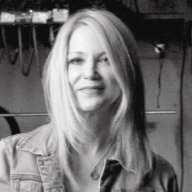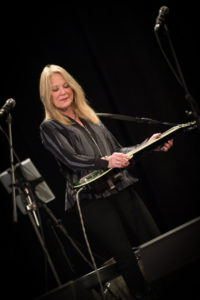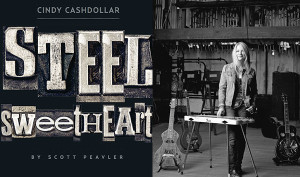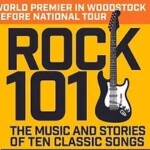 Writer Ian Patience spoke with slide guitarist Cindy Cashdollar in a convoluted path that, to date, could only occur in 2020. English by birth and now based in locked-down France, Patience spoke with Cashdollar, who’s equally locked down in Woodstock, NY. The interview was arranged by Cashdollar’s publicist, Cash Edwards (really!), who was vacationing in France and now is unable to return to her work and home in Austin, TX. Posted by New York City-based Elmore Magazine, the interview itself took place in cyberspace.
Writer Ian Patience spoke with slide guitarist Cindy Cashdollar in a convoluted path that, to date, could only occur in 2020. English by birth and now based in locked-down France, Patience spoke with Cashdollar, who’s equally locked down in Woodstock, NY. The interview was arranged by Cashdollar’s publicist, Cash Edwards (really!), who was vacationing in France and now is unable to return to her work and home in Austin, TX. Posted by New York City-based Elmore Magazine, the interview itself took place in cyberspace.
 Cindy Cashdollar is more than a memorable name. She’s a five-time Grammy winner—so far—with an impressive history and a rare fretwork talent that has kept her in constant demand as a go-to slide player for many of the greatest names in the music world. And, she rides sidesaddle solo too, with a new album, Waltz for Abilene.
Cindy Cashdollar is more than a memorable name. She’s a five-time Grammy winner—so far—with an impressive history and a rare fretwork talent that has kept her in constant demand as a go-to slide player for many of the greatest names in the music world. And, she rides sidesaddle solo too, with a new album, Waltz for Abilene.
Cindy Cashdollar is that rarity, a musician’s musician. Based in the world-famous Woodstock area of New York State, namesake of the legendary festival held just over fifty years ago, she is partly grounded by the dreaded Covid-19, with venues across the world now closed, unable to get out on the road, to play, tour or generally promote her new release. With lockdown in place, but stir-crazy fever yet to take hold, we chatted about the new album and the simply stellar cast of musicians featured on the release.
“I had to have Albert Lee. He’s amazing, I was touring with him in the midst of making this album and was happy for the opportunity to also record with him on a couple of the tracks I know he’s usually associated with a lightening-paced style of playing. but we did a slower song “Memphis Blues,” with Albert on both acoustic & electric guitars and had quite a bit of fun with it.” she explained.
We went on to many of the others, from Sonny Landreth: “We’ve been great friends for so long and had performed “Sey Seychelles” together live, so it was a natural thing to include that on the album. But I had to catch him during my two days off on a tour, flying from the west coast to Louisiana to record and then jumping back again.”
And Larry Campbell, I ask? Another Woodstock resident and neighbor famed for his versatility and work as writer, player and producer with countless major US names. Cindy chuckles and says: “Well, I needed fiddle and mandolin, so who else to turn to but one of the best who can play both. Who else are you gonna call?”
The jaw-dropping roll-call continues: “Everybody who plays on the album are good friends. It made it all more fun. There’s Mike Flanagan, Omar Kent Dykes, Derek O’Brien, Ray Benson, Amy Helm. Jake Langley. Sonny Landreth. Rory Block. Larry Campbell. Marcia Ball, John Sebastian and Arlen Roth. I’d been working on and off with Arlen for so long, he wrote the song I wanted on the album so who better to have play on it?”
With such a range of musicians, all busy with their own recording and touring schedules, I wonder how long it took to put the project together: “Four and a half years,” she confirmed, before adding: “I had a bad car accident in 2017 that took a year out. It was the project that just kept going but made it in the end!”
Cashdollar is a guitarist who moves effortlessly between genres, hopping around with seeming ease, quality and self-assurance. Known for her near-decade with leading US Western swing giants, Asleep At The Wheel, where she picked up her five Grammys, she laughs when recalling how that one came about, in many ways against the odds:
“I’d moved from Woodstock to Nashville in 1992 to explore more musical opportunities. I had just started fooling with the steel guitar as a hobby and had a demo with one steel instrumental amidst the other Dobro and lap steel cuts. The Wheel came into town to tape a show, and a friend had told me their longtime steel player was leaving the band, that I should get a demo tape to them., which I did. some months later I was hired and had to move to Austin, which was their home base.
“It was a rough gig at first, constantly trying to improve on the steel, as well as going deep into Western swing music. Actually, [leader Ray Benson] said, ‘I’ll give you six months,’ so it was really sink or swim, but it turned out to be a great time. They gave me some time and space to develop.

And what about that awards circus, I venture? “It’s all good. It’s not about the award itself, it’s the fun and it’s good to get one, it helps with promotion and the like. I love the ceremony itself. I go along and just stand looking around. Thinking, ‘Wow, there’s that one, and that one or that one.’ All those great musicians!” Cindy laughs at the very thought of finding herself in company with many of the players she herself admires, who have influenced her and been the soundtrack of much of her life.
Revered for her steel and slide guitar work, Cashdollar kicked off with guitar at home in Woodstock before hearing slide and being turned on to that zinging sound: “I’ve always liked different kinds of music at different times of my life, from starting out with folk-music on guitar to Dobro, then lap steel and steel guitar. Growing up in Woodstock was a loose thing back then—not crude, just more relaxed. I could go along, even as a fifteen-year-old, to clubs and see some good live music. I remember seeing guys like Happy Traum (another Woodstock resident and a true US folk-blues-roots icon), Billy Spier, Odetta, Van Morrison, Bonnie Raitt and John Hammond Junior. John’s always been a favorite, one of my blues heroes. I saw so many of these people at the Woodstock Playhouse. There was so much variety going on.
“I was a bit of a late bloomer really, as far as taking up another instrument. I didn’t start with the Dobro until my early 20s. Mike Auldridge was doing such great things with a Dobro back then, so influential and inspiring—his Eight String Swing album inspired me to try swing tunings on my Dobro and that later got me interested in steel guitar.. But I heard all this music, so many styles and ways of playing. It can never be boring, there’s always so much to learn, so much to try out.”
I raised a query about how she found working with Bob Dylan, a guy with a reputation of being tricky at best of times. “I got on well with him. He’s a really lovely person. I was called to play on his “Time Out Of Mind” album, in a studio, I think in Miami, and we were waiting for his arrival. one of the studio crew whispered to me ‘Bob’s coming, Bob’s coming.’. I didn’t know if that was a cue to do anything in particular or what, When he walked in, I was tuning up or something at the time and he came over and introduced himself, as ‘Hi, I’m Bob.’ He was absolutely fine, no problem whatever.”
And the same goes for Van Morrison with whom she recorded and toured. “Van is fine, interesting guy. He was one of the performers I saw when I was very young, in an old theater called The Woodstock Playhouse. We talked a lot about Woodstock because he lived there for a time,” she said, before turning to another bluesman with a strange reputation, the late Leon Redbone.
“I auditioned for him at a sound check, he invited me to play the show that night, and then to join the band on the tour. I met up with them two days later, and that tour turned into the five years. I kind of knew what was expected. To me it was just another job at first, like any other, and I soon learned his quirks. He was quirky, difficult to get to understand at first. Never out of character, loved white suits, black suits. I’d go over to his place, say the night before we went on the road, and he’d not be wearing the suit but maybe the white trousers and cooking in the kitchen. He was a great cook, delicious food. And I never saw him wear blue jeans, he was always dressed just so,” she again laughs at the memory of an old buddy before revealing an aspect of his perfectionism: “We did a gig once, and I had thrown in a wild note. Afterwards in the dressing room Leon asked me if I’d played the extra note. I nodded, saying I was trying out a different thing. Obviously not happy, he said ‘Just stick to the melody.’
 “When I got the job with Asleep At The Wheel, I was working with Leon. I felt guilty about it, about sort of deserting him. But he was great, so helpful, understanding. I told him I felt terrible but had to do it. He said he knew I was able, but asked if I’d be able to keep up with their schedule! He was so gracious about it all.”
“When I got the job with Asleep At The Wheel, I was working with Leon. I felt guilty about it, about sort of deserting him. But he was great, so helpful, understanding. I told him I felt terrible but had to do it. He said he knew I was able, but asked if I’d be able to keep up with their schedule! He was so gracious about it all.”
Inevitably thoughts turn to her work with another former Woodstock resident, still based in Upstate New York, blues-slide great, Rory Block. Cashdollar and Block work together as a duo, “Sisters of Slide,” and have gained a huge international following for their astonishingly nuanced, joint slide endeavors and fretwork abilities.
“I love working and playing with Rory. I actually took some guitar lessons with her when I was young and she was living here in Woodstock. She’s a fabulous singer and player.. There was a time when we hadn’t seen each other for maybe 20 years but when we met up again, it was like we’d always been around. We get out together whenever we can, but it’s always hard to find the time in both our schedules to get together and tour. We just don’t do it often enough…but that’s only down to our own tour and work schedules really.”
Looking back over her career to date, Cashdollar said, “There are times when I almost pinch myself and think, ‘Where am I? How did that happen?’ Two guys gave me the best advice I ever had as a musician, both said the same thing. Rick Danko [another former Woodstock resident and member of legendary outfit, The Band] and Paul Butterfield. Both told me ‘Never forget, less is more.’ I think Leon [Redbone] believed it too, the beauty of simplicity, played with feeling. It was advice that I’ve taken to heart.”
Cindy laughed at the thought as we said our farewells.
—Iain Patience
Scottish by birth and now based in SW France, Iain Patience holds degrees in Anthropology and Law. A qualified UK lawyer and a practicing journalist, Patience has written for a British national daily broadsheet, The Daily Telegraph, and BBC Radio, He’s written sketch comedy for UK national Radio & TV and serious pieces for Elmore Magazine. Patience is now the Editor of Blues Matters Magazine, UK.







Be the first to comment!